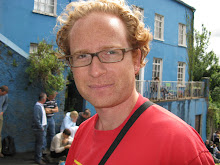I had an unbefuckinglievable day yesterday. I know I haven't written about the first half of the rotation yet, but I'll do that soon. I've got to get this down on paper first. The only background needed is that I'm with neurology these days...
The day started earlier than usual with rounds in A+E at 8. The first patient was a young German woman who was having some unilateral numbness, decrease in power, hyperreflexia, and some cerebellar signs. Unfortunately MS is high on the list of possibilities for her. She's going to need an MRI, and possibly a lumbar puncture to look for oligoclonal bands. It was interesting to see a possible diagnosis from the beginning. As for now her story is unfinished. Still waiting for the MRI.
Next we went on to see an young American woman with a crazy medical history. I'll have to remain vague in this forum as the details could theoretically reveal who she is to people who know her. She has a long history of a heart condition, and seizures are some of the effects of that. After her seizures she gets an atypical presentation of Todd's paralysis, which I had never seen before. It was interesting to get to talk to someone who is very familiar with her own medical condition, and I think she appreciated having another American to chat with. I think she's a republican, but I'm trying not to hold that against her! I also did a little research for her and for us as she used brand names for medications, and those are different from country to country. Another good reason to stick to generics. She had another seizure during the day, but was more or less OK. We don't know much more about her at this point either -- she'll need an EEG, though that's unlikely to show anything.
The third patient of the day was a young Polish man (are there any Irish in the hospital ?!!?!) also with a seizure history. He had had an attack, as he liked to call it, the day before, but was still quite confused. Though it's not unheard of for the postictal phase to last a few days, it's not particularly common either. His wife said this is normal for him, and that he was frequently confused, agitated, and slightly agressive. He, too, got an EEG, which luckily for him meant he didn't need a lumbar puncture. We got a phone call from the neurophysiologists while we were seeing some other patients -- the man in A+E was in a non-c0nvulsive status epilepticus! Never heard of that before, much less seen it. He was constantly seizing, though without motor involvement so it wasn't obvious. But it definitely explains his confusion and other neurological symptoms. Crazy.
After we got them squared away we went to do some consults that were requested by other doctors in the hospital. The first was a young woman who was brought in by the neurosurgeons because she was having headaches and spells during which she got "spacey". The MRI had signs that initially looked like a tumour to the surgeons, but is more likely to be a herpetic encephalitis. An unusually non-dramatic presentation of the illness, and also unusal because our patient had no other signs of a herpes infection. She should be well after two weeks of intravenous acyclovir.
The next man is another foreign natural who presented with a constant throbbing headache and a 6th cranial nerve palsy with very easily elicited eye-movement signs. His MRI showed a lesion of some sort in his frontal lobe with tons of oedema. As part of the work up he was diagnosed with advanced AIDS. As we were getting ready to leave the ward we got a call from radiology that his CT thorax showed what was likely to be a splenic lymphoma, so the lesion in his brain was likely to be lymphoma as well.
At the end of the day we went to visit another interesting, potentially exciting case. About a month ago a man fell and has been in hospital for the last three weeks with an enormous subdural haematoma, essentially in a coma. The night before last he started opening his eyes to command, squeezing our hands on command, and appears to be trying to speak. A most unexpected turn of events. It's still unlikely that he'll regain much function, but he also wasn't expected to do this well, so the neurosurgeons will reevaluate after the weekend. What was particuarly poignant was that at the same time as this man was making a recovery, a patient in a different bed in the same room was receiving his/her last rites. A perfect microcosm of the joy and sorrow present daily in a hospital.
I felt like I had had too many cups of coffee by the end of the day I was so revved up. I relize Ian may be the only person who finds this day as exciting as I did, but I feel quite lucky to have seen so many interesting patients and pathologies all in one day. I've been having a great time in the last month particularly, and I think it's a good sign that medicine is what is helping to break through the low mood I've been battling for the last few years.
More tales of my time with nephrologists to come....
Saturday, December 06, 2008
Subscribe to:
Comments (Atom)



